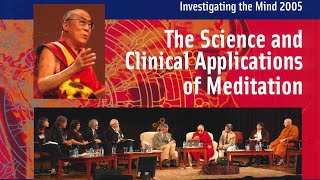Mind & Life XIII – Session Four – Clinical Research II: Meditation & Physical Health
Mind & Life XIII – Session Four – Clinical Research II: Meditation & Physical Health

*****
SPEAKERS
David S. Sheps, M.D.
John F. Sheridan, Ph.D.
MODERATOR
Esther M. Sternberg, M.D.
PANELISTS
The Dalai Lama
Jan Chozen Bays, M.D.
Richard J. Davidson, Ph.D.
Joan Halifax, Ph.D.
Margaret E. Kemeny, Ph.D.
David S. Sheps, M.D.
John F. Sheridan, Ph.D.
INTERPRETERS
Thupten Jinpa, Ph.D.
B. Alan Wallace, Ph.D.
*****
As scientific research establishes that many “physical diseases” are modulated by psychological processes such as stressful life events and emotions, the mechanisms underlying these interactions have been targets for scientific research. As the mechanisms become more well understood, the rationale for using meditation as an intervention for certain types of physical illnesses becomes more compelling and more solidly grounded in modern scientific research.
This session will showcase modern research on the application of meditation-based interventions to cardiovascular disease and to diseases that include a primary immune component.
*****
SPEAKERS
David Sheps: Mindfulness-based stress reduction and cardiovascular disease
Psychological stress can markedly decrease blood flow to the heart, dramatically elevating the risk of dying. This talk will describe the protocol of an ongoing NIH funded study of the impact of Mindfulness-Based Stress Reduction on blood flow responses to mental stress in cardiac patients using cardiac imaging, and on their quality of life.
John Sheridan: Neural-immune interaction
Various forms of stress affect specific brain systems and through alterations in these circuits, profound changes in immune function can arise. This talk will present an overview of modern research on the impact of different kinds of stress on specific immune processes. The mechanisms through which these effects are produced will be described.
This corpus of research can then be used to consider the mechanisms by which meditation may operate to influence diseases of the immune system.
